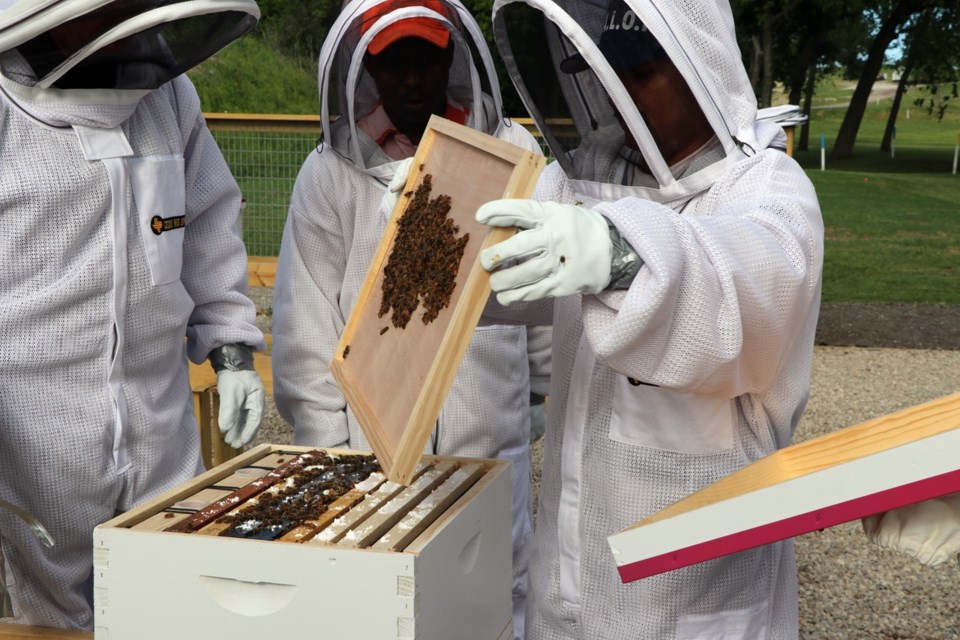Open a beekeeper’s beehive, and the bees will talk. Look closely (through your protective gear, of course), and you will see bees conducting a waggle dance, tails in the air, using their pheromones to express their concerns about the hive intruder. Queens are on the move, sometimes alerting her hive with a piping call.
The piping call is one that inmates at the Collin County Sheriff's Office are learning about as they navigate the art of beekeeping. It's part of a one-of-a-kind beekeeping program at the CCSO Detention Facility with the help of Texas Bee Supply owners Lyndon and Blake Shook. Inmates are learning first hand about how to raise bees and harvest honey.
Collin County Sheriff Jim Skinner says it's their way of instilling pride of ownership and confidence in the inmates.
“I learned from an early age what heroes the honeybees were when it came to pollination and increasing crop yields,” Skinner says. “My grandfather had me actively participate in caring for and robbing the honey bee hives. I have good memories of those times. I was occasionally stung, but wow, I really loved that honey on my grandmother’s biscuits.”
The program, launched in May 2020, benefits the Sheriff’s Convicted Offender Re-entry Effort, SCORE, and the Veterans Accessing Lifelong Opportunities for Rehabilitation, VALOR programs. Currently there are 31 people in the SCORE and VALOR programs, and Cmdr. Texas Bee Supply is there “every step of the way,” says Cmdr. Christopher Prepiczka.
Texas Bee Supply takes the inmates through the entire first year of beekeeping. They learn hive management and disease treatment, with the final stage being honey harvest. Texas Bee Supply beekeeper Debi Zinser says it's a rewarding experience both for the inmates and for herself.
“Many of the people have not been out of the city much less ever been that close to a bee hive,” she says.
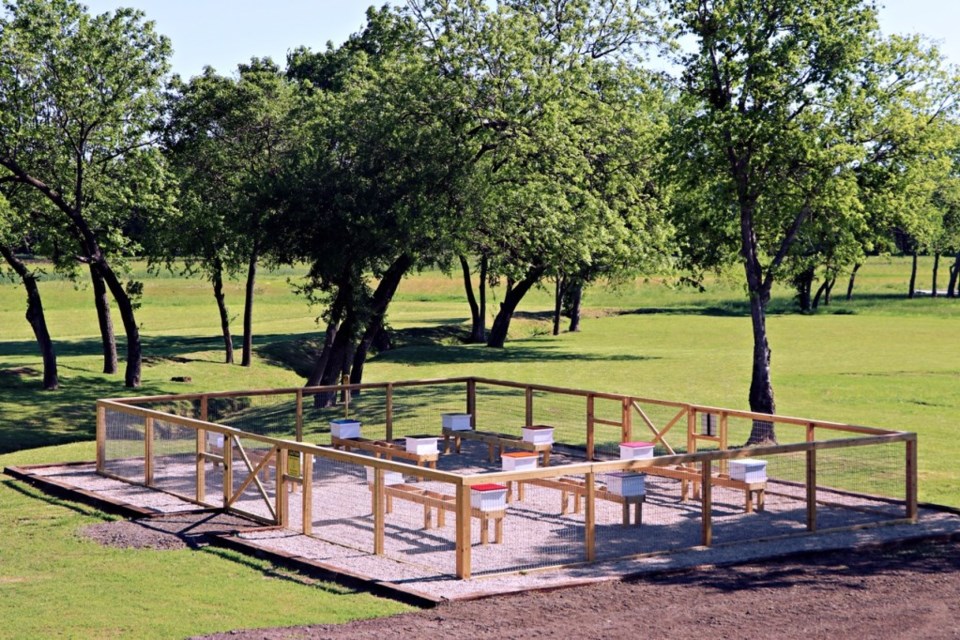
Helping Existing Crops
After Skinner won his election in November 2016, his staff told him that they had seen a recent reduction in crop yields on the 40 acre farm. The inmates operate the farm for the sheriff's office. The vegetable garden program, which started under former Sheriff Terry Box, has been running for more than 25 years. The crops are used to feed the inmates. The garden was part of the SCORE program, which offers a diversion for the inmates. Skinner says the SCORE and VALOR programs are designed to reintroduce certain inmates back into society.
Skinner, who grew up around bees, decided building a bee apiarty would boost the CCSO's farming operation. They started with 12 hives, each containing around 25,000 honeybees. By 2021, the CCSO expects to expand its beekeeping program to 24 beehives. This will accommodate the natural increase of the bee population in the apiary.
“I thought it appropriate to take from a page in the history book, and in my mind’s eye, we could accomplish a number of things by taking this path,” Skinner says.
Skinner says that the bee program would save even more tax dollars by harvesting even more food. It also teaches the inmates a trade, he says. Additionally, Skinner says it gives his staff a mission to accomplish that has tangible positive results for the inmates and the communities they serve. Not to mention that it produces "a very special food for our SCORE and VALOR inmates to consume."
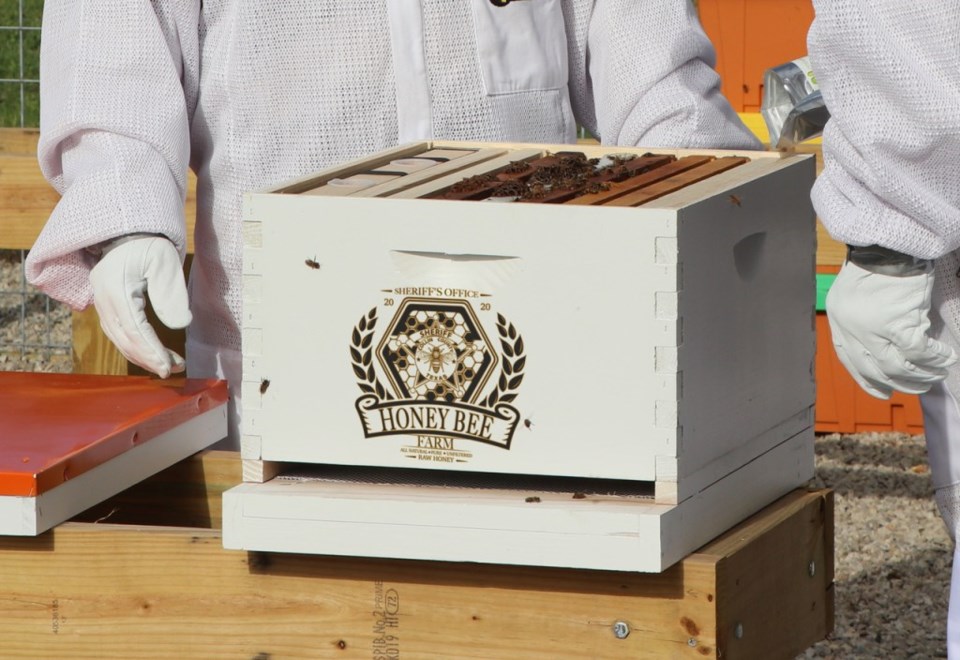
Benefiting the Bees
Both the bee program and the vegetable garden are accomplished without using tax dollars, Skinner says. Instead, the money for these programs comes from their “portion of the profits of a third-party vendor who sells commissary items to inmates.”
Beekeeping is already benefiting the prison’s crops, says CCSO spokesperson Jessica Pond. “Bees are pollinating our garden area, and that is helping us. It’s helping our plants and food supply,” she says.
The honey from this program is not for sale, but goes back to the prison, just as the vegetables from the garden do. But it hasn't stopped the sheriff's office from creating a brand for the honey products in hopes that they may be able to farm enough to make it available to the public.
"It brings me a great sense of pride in my employees, and with the inmates, to see what they have accomplished working together," Skinner says. "This honey bee program is helping us to help them to succeed and to be better citizens. "
Through this program, the bees benefit, too. Bee colony collapse threatens honeybee populations nationwide. By raising honeybees, the inmates are contributing to efforts to improve the honeybee colony numbers across Collin County, and they are contributing to the work honeybee hobbyists are doing to save bees across the county and the state of Texas.
“This jail program is a service that could go a long way to protecting Collin County’s pollinators,” Skinner says. “If replicated elsewhere, it could have wide-ranging ecological impacts across the nation.”
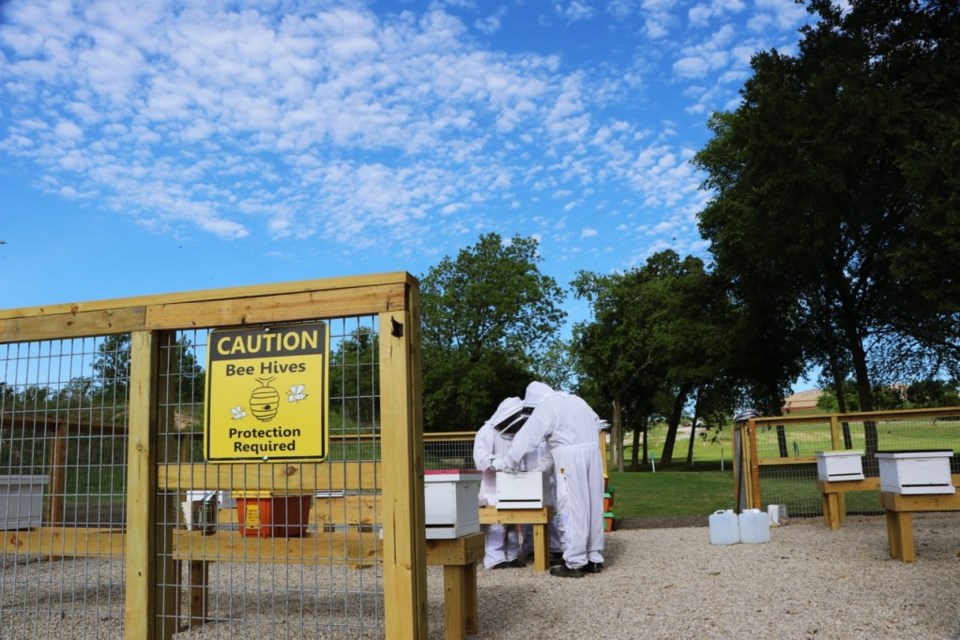
Skills for Life
With this program, Skinner says that they can “assist these inmates in recognizing the importance of caring for a sensitive animal species that is susceptible to disease and death if not cared for properly.”
Having the beekeeping experience and skills, Skinner says, could help inmates land jobs in the honey bee industry upon release from custody. In addition to the many honeybee hobbyists in Collin county who might need a lending hand, there are several honeybee rescue groups, honey producers, and honeybee farms in the county and across Texas.
Pond points out that there is a lot of opportunity in working to protect the bee population, and having this in the prisons has a bigger impact on inmates once they leave the system.
"Once people leave our program, they could go to work for the bee keeping suppliers and others who work with bees and honey," she says. "They will know the ins and outs of the job and be able to contribute. "
As of right now the training is more of a journeyman experience, according to the CCSO spokesperson. Pond says that the CCSO is looking into licensing and certification, but that requires more work.
“This is a new program, and we know it’s beneficial for inmates—both for the ones in the programs and the ones who are incarcerated,” she says. “They will get to eat the honey, and we all know the health benefits of honey with allergies and other areas.”
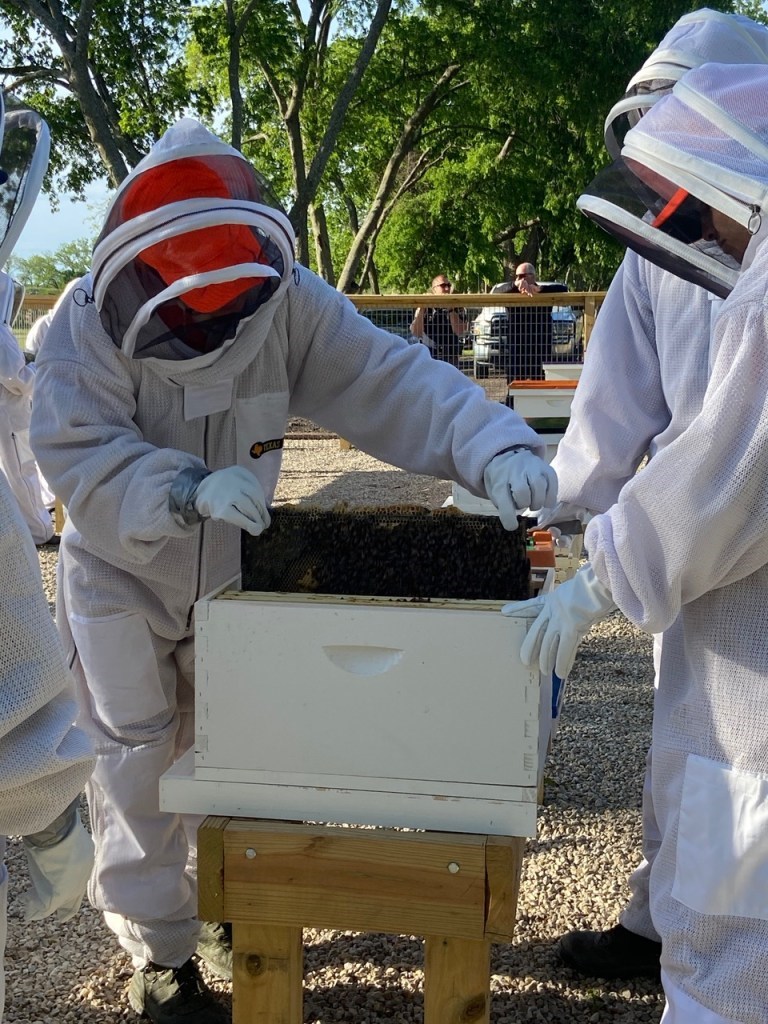
Bees Up Close
The bees sold by Texas Bee Supply and used at the CCSO Detention facility are the Italian Carniolan and Golden Cordovan, both are gentle bees, Zinser says.
Inmates often have firsthand, hands-on bee experiences. They sometimes experience a swarm and the process of gathering a ball of bees and returning it to the hive. It's an experience that bee keepers have been experiencing at Texas Bee Supply since the company was founded in 2017. They currently have about 10,000 hives, and sell bees in a large portion of North Texas, Oklahoma, Louisiana, and beyond. The company recently opened a second location in the Dayton area.
Texas Bee Supply offers beekeeping classes for all ages, and sells bees and supplies in both their locations. They also support local bee clubs. “Our focus is on being a resource and sharing information, we are mentors," Zinser says. "Our motto: beekeepers helping beekeepers.”
So it was only natural for Texas Bee Supply to say yes when Skinner, after attending a beekeeping class at Texas Bee Supply, inquired about starting a bee program at the jail. Zinser, along with the Shooks, offered to mentor the inmates. A lot of them had never even had real honey.
“It’s not like what you get in the grocery store. It’s a clean pure taste,” Zinser says. They also got to eat the honeycomb. There were a lot of firsts for them.
“Seeing the inmates experience bees all over their hands, fingers and face area—they were mesmerized,” she adds. “ They got to hold the bees; you have to move quickly and gently, but you can get close to bees.”

